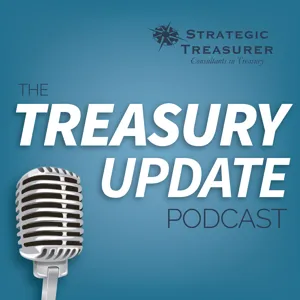Podcast Summary
The Fed Takes Action to Prevent Bank Failures: Implications for Investors: The recent failures of Silvergate, Silicon Valley Bank, and Signature demonstrate the need for investors to closely monitor regulatory developments and consider the potential impact of interest rate hikes on their investments in money market funds. Stay aware of changing market trends to avoid risks.
The recent bank failures of Silvergate, Silicon Valley Bank, and Signature have caused the Fed to take action to prevent collapse of the banking system. The hiking of interest rates by the Fed in 2020 has had a major impact on these banks. Investors need to pay close attention to the implications of these events and think twice before investing in money market funds. Silvergate, as the face of crypto banking had assets that grew quickly, but it collapsed due to recent industry and regulatory developments. As each crisis sets a precedent in making impacts in the crises that follow, it is important to stay aware of changing market trends and regulation.
Impact of Rising Interest Rates on Banks and Investment Choices: The rise in interest rates has led to people choosing to invest in bonds instead of tech stocks and Bitcoin, causing banks with a concentrated deposit base to suffer as declining deposits result in impaired balance sheets and decreased assets.
The rising interest rates have affected the investment choices of people, as they now prefer investing in bonds yielding 4-5% instead of tech stocks and Bitcoin. This has affected banks, especially those with a concentrated deposit base, as they face declining deposits and impaired balance sheets. Silvergate suffered a loss of over 70% of its deposit base, leading to a decline in assets due to rising interest rates, which put pressure on the bank's balance sheet. Silicon Valley Bank, on the other hand, failed to diversify its deposit base, following which it collapsed. The declining deposits have made it difficult for banks to survive, especially when their assets are losing value due to rising interest rates.
SVB's Risky Bonds Gamble Leads to Investor Panic and Regulator Intervention: SVB's over-reliance on government bonds resulted in significant losses when the venture capital industry experienced a downturn. Regulators had to intervene to prevent further damage, and depositors were protected by the FDIC.
SVB specialized in servicing businesses and saw massive inflows through 2020 and early 2021, which caused their balance sheet to triple. They bought supposedly risk-free government bonds to protect their net interest margins. However, the venture capital space hit a wall when the Fed removed liquidity from the economy, and investor funding collapsed. SVB found itself in trouble when its positive base was destroyed and it had to sell bonds to meet withdrawal requests. The bank marked these bonds as being held to maturity on their books, which meant they didn't show any unrealized losses. When it had to sell bonds it intended to hold for maturity, it realized losses. Prominent VC firms panicked and advised their portfolio companies to withdraw funds, causing regulators to respond and take control of the bank. Depositers were protected by the FDIC, which charges fees to license banks for insurance funds.
The Fallout of Bank Failures and the Implications for Customers: Bank failures can cause panic and contagion concerns, leading to potential customers avoiding banks. Customers prioritize safety and stability and may avoid banks with any hint of risk.
The failure of three banks caused panic among investors due to unrealized losses across the entire banking system, leading to contagion concerns and withdrawals. Bank depositors are risk-averse and the bailout of banks doesn't guarantee confidence in their safety, leading to potential customers avoiding them. Banks faced the same issue of near-zero interest rates for a decade and record deficit spending during the pandemic, resulting in unrealized losses. The FDIC, Federal Reserve and Treasury guaranteed all deposits to prevent bank runs. The failure of banks was caused by real issues in the business cycle and poor risk management. Bank customers prioritize safety and stability and may avoid banks with any hint of risk.
US Banking System's Challenges and Available Levers: Though US banks are facing challenges, the Fed's decision to allow banks to post bonds at par value, coupled with government authorities' levers to stabilize the situation, can reduce potential losses and stabilize the economy and banking system.
The US banking system is facing significant challenges due to many banks, including Silicon Valley bank, being underwater on their bonds. However, the Fed has announced that these banks can post their bonds as collateral at par value, thus reducing potential losses if they are forced to liquidate their bond and loan portfolio. The banking system has a total capital buffer of 2.2 trillion dollars, but the total unrealized losses are between 1.7 trillion and 2 trillion dollars, indicating that many banks are fragile and vulnerable to failure. Despite this, it's imperative to remember that government authorities have many levers to stabilize the situation by changing things such as emergency lending facilities or deposit insurance limits. Therefore, we should not underestimate the number of levers that authorities have at their disposal to stabilize the economy and banking system.
The Importance of FDIC Insurance for All Bank Deposits: FDIC insurance extension can provide stability to the banking system and protect all deposits, especially for wealthier individuals and companies with large cash balances. It prevents small businesses from defaulting on payments and ensures that systemically important global institutions do not fail.
Around 40% of all bank deposits are uninsured, but FDIC insurance extension is being considered to cover all deposits. The less volatility in the banking system, the better it is for society. Wealthier individuals and companies with large cash balances in their bank need to be concerned about their deposits in case of a bank failure, as it could take weeks or months to liquidate enough assets to meet withdrawal requests. This could put small businesses at risk of defaulting on payments or not paying employees. Bank deposits flow to big institutions, designated as systemically important globally, as they cannot be allowed to fail. Each crisis sets a new precedent, and regulators step in to prevent doomsday scenarios.
Credit Suisse's AT1 Bonds Write-Off Weakens Investor Appetite: The recent sale of Credit Suisse to UBS for $3 billion at a 99% fall from its peak underscores the lender's dire situation, with Swiss regulators wiping out $17 billion worth of Credit Suisse's AT1 bonds. This move will likely dampen investors' appetite for such securities.
The recent sale of Credit Suisse to UBS for $3 billion at a 99% fall from its peak is a sign of its desperate situation, losing $10 billion per day in deposits. Swiss regulators wiped out $17 billion worth of Credit Suisse's bonds to make the deal work at a substantial discount, removing all risk from UBS. These bonds, called AT1 bonds, were introduced after the 2008 crisis to transfer banking risk from taxpayers to bondholders. Despite their high interest rates, Credit Suisse's AT1s included a provision that allowed bondholders to lose their entire investment before shareholders did. The complete write-off of Credit Suisse's bonds from one of the largest issuers of AT1s will weaken investors' appetite for these types of securities going forward.
Potential Instability in Bond Yields Could Limit Bank Loans and Tighten Financial Conditions Key Takeaway: The Fed's changes in hiking trajectory and flight to safety could limit banks' ability to issue expensive bonds and make new loans, making significant rate hikes unlikely and leaving American banks vulnerable.: Subtitle: Potential Instability in Bond Yields Could Limit Bank Loans and Tighten Financial Conditions The Fed's changes in hiking trajectory and flight to safety could limit banks' ability to issue expensive bonds and make new loans, making significant rate hikes unlikely and leaving American banks vulnerable.
The drop in bond yields, including US treasuries, due to the changing outlook in the Fed’s hiking trajectory and flight to safety, could lead to instability and ripple effects throughout the rest of the economy. The impact of this is reduced ability for banks to issue expensive bonds in the future, which may result in a limited ability to make new loans to the real economy. Investors anticipate changes in the Fed's fight against inflation and prioritization of financial stability. Bank failures have significantly tightened financial conditions in ways that the Fed has failed to address, making meaningful rate hikes unlikely. The US government has relied on American banks to fill the void in purchasing treasuries to fund deficit spending, but this reliance has made banks vulnerable, especially to the rate hikes that the Fed has inflicted on them.
The Dilemma of the Federal Reserve: Inflation, Financial Stability, and Credibility: The Federal Reserve faces a dilemma between fighting inflation and maintaining financial stability, as pausing or cutting rate hikes risks losing credibility, but continuing hikes may threaten the financial system. A recession may temporarily bail the Fed out of inflation fight, but prolonged economic weakness is not desirable.
The Federal Reserve's hiking cycle is probably done or close to pausing as inflation and the US seller's value serve as the re release valve. With the recent events causing banks and financial institutions to borrow from the Fed's discount window instead of being caught off guard by a bank run, fears are elevated. Hiking rates may threaten to blow up the financial system, but pausing rate hikes and even cutting jeopardizes losing credibility over fighting inflation. Heading into a recession temporarily bails out the Fed in its inflation fight since banking crises and recessions are typically disinflationary. However, any slowdown and price growth that brings inflation down to 2% is probably the result of some sort of prolonged economic weakness.
How to Prepare for Inflation and Market Volatility as an Investor.: To prepare for market volatility, it's important for investors to have a strong emergency fund with cash savings, be informed and intentional about their portfolio, practice emotional discipline, and review their investments with calculated, unemotional decisions. Warren Buffet advises stepping up to buy assets when prices drop.
To prepare for potential inflation and market volatility, investors should consider having a strong emergency fund with cash savings, being informed and intentional about their portfolio, and practicing emotional discipline. Great investors like Warren Buffet step up and find assets to buy when the market panics and prices drop. To do so, having cash on hand is crucial. Being financially prepared alone or emotionally prepared alone is not helpful, as both are necessary for success. It is also important to review your portfolio and understand why you hold each investment. Understanding the situation and making calculated, unemotional decisions is key to success in times of crisis.
Managing Fear and Protecting your Investments in the Digital Age: During market volatility, prioritize your mental well-being by disconnecting from social media and sticking to your investing strategy. Keep an emergency fund, journal to recognize patterns, and consider a separate account or high yield savings for rainy day funds.
Fear spreads faster than ever due to social media and technology, leading to fast market movements and contagion. When anxious, turn off your phone and take a break. Stick to your investing strategy and have a strong emergency fund. Journaling during market volatility can help recognize patterns in the future. Consider parking cash in a money market fund or high yield savings account for a rainy day fund or intentional savings, but be aware of differences in FDIC insurance. Having a separate account at a different institution may help avoid tapping into it for regular expenses.
Balancing Risk and Return with High Yield Savings Accounts and Money Market Funds.: Investors can consider putting $250,000 in a high yield savings account and the rest in a money market fund to earn higher returns with slightly more risk. Compare rates to make the best decision. Check out We Study Markets for daily market news and insights.
Investors can consider keeping $250,000 in a high yield savings account and any cash beyond that in a money market fund to earn a slightly higher return for the extra risk taken. Money market funds offer more income than bank accounts, but without the insurance protection. However, if investors are concerned about uninsured deposits, they can opt for a money market fund to earn more income. It's advisable to look at the rates offered by banks and consider a money market fund if they want to step outside the FDIC insurance limit. We Study Markets, a daily market news newsletter, covers important stories and gives snapshots of market prices. It also provides in-depth insights into specific topics relevant for value investors.






